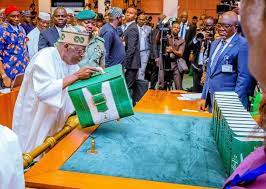Tinubu presents proposed N27.5tn 2024 Appropriation Bill before joint NASS, seeks ‘reasonable dispatch’

![]()
President Bola Tinubu has presented his first proposed Appropriation Bill of N27.5tn in the 2024 fiscal year before a joint session of the National Assembly (NASS) in Abuja, Wednesday.

President Tinubu presenting the 2024 Appropriation Bill before a joint session of the NASS, Wednesday
Tagged, the ‘Budget of Renewed hope,’ President Tinubu also urged the National Assembly to conclude deliberations on the 2024 budget proposal with presented before it ‘reasonable dispatch,’ adding that his administration’s ‘goal is for the Appropriation Act to come into effect on the 1st of January 2024.’
Tinubu who explained that the country’s economic conditions remain challenging both abroad and at home, blamed the situation on ‘global headwinds,’ as he however, noted that the Nigerian economy has proven resilient, maintaining modest but positive growth over the past twelve months.
According to the president, Nigeria’s inflation has trended upward due to weak global conditions, and in order to contain the rising domestic prices, his administration ‘will ensure effective coordination of fiscal and monetary policy measures, and collaborate with sub-national.’
Tinubu who disclosed that an aggregate revenue of 11.045 trillion naira was projected to fund the 2023 Budget of 24.82 trillion naira with a deficit of about 6.1 percent of GDP, explained further that the revised 2024-2026 Medium Term Expenditure Framework (MTEF) and Fiscal Strategy Paper (FSP) set out the parameters for the 2024 Budget.
“As of September 30, the Federal Government’s actual aggregate revenue inflow was 8.65 trillion naira, approximately 96 percent of the targeted 8.28 trillion naira. Despite the challenges, we continue to meet our obligations.
“After a careful review of developments in the world oil market and domestic conditions, we have adopted a conservative oil price benchmark of 77.96 US Dollars per barrel and a daily oil production estimate of 1.78 million barrels per day. We have also adopted a Naira to US Dollar exchange rate of 750 naira per US Dollar for 2024.
”Accordingly, an aggregate expenditure of 27.5 trillion naira is proposed for the Federal Government in 2024, of which the non-debt recurrent expenditure is 9.92 trillion naira while debt service is projected to be 8.25 trillion naira and capital expenditure is 8.7 trillion naira,” Tinubu said.
Tinubu stated that the Federal Government is to fund the items needed to restore macroeconomic stability and mitigate the harsh impact of subsidy removal in Nigeria.
The president highlighted key issues relating to the budget proposals for the next fiscal year.
”The 2024 Appropriation has been themed the Budget of Renewed Hope. The proposed Budget seeks to achieve job-rich economic growth, macro-economic stability, a better investment environment, enhanced human capital development, as well as poverty reduction and greater access to social security.
“Defence and internal security are accorded top priority. The internal security architecture will be overhauled to enhance law enforcement capabilities and safeguard lives, property and investments across the country.
“Human capital is the most critical resource for national development. Accordingly, the budget prioritizes human development with particular attention to children, the foundation of our nation.
”To improve the effectiveness of our budget performance, government will focus on ensuring value for money, greater transparency and accountability. In this regard, we will work more closely with development partners and the private sector.
“To address long-standing issues in the education sector, a more sustainable model of funding tertiary education will be implemented, including the Student Loan Scheme scheduled to become operational by January 2024.
“A stable macro-economic environment is important to catalyse private investment and accelerate economic growth. We have and shall continue to implement business and investment-friendly measures for sustainable growth.
”We expect the economy to grow by a minimum of 3.76 percent, above the forecasted world average. Inflation is expected to moderate to 21.4 percent in 2024.
”In preparing the 2024 Budget, our primary objective has been to sustain our robust foundation for sustainable economic development. A critical focus of this budget and the medium-term expenditure framework is Nigeria’s commitment to a greener future.
”Emphasizing public-private partnerships, we have strategically made provisions to leverage private capital for big-ticket infrastructure projects in energy, transportation and other sectors. This marks a critical step towards diversifying our energy mix, enhancing efficiency, and fostering the development of renewable energy sources. By allocating resources to support innovative and environmentally conscious initiatives, we aim to position Nigeria as a regional leader in the global movement towards clean and sustainable energy,” he said.
According to Tinubu, Nigeria remains committed to meeting its debt obligations and that projected debt service is 45% of the expected total revenue.
”Budget deficit is projected at 9.18 trillion naira in 2024 or 3.88 percent of GDP. This is lower than the 13.78 trillion naira deficit recorded in 2023 which represents 6.11 percent of GDP. The deficit will be financed by new borrowings totalling 7.83 trillion naira, 298.49 billion naira from Privatization Proceeds and 1.05 trillion naira drawdown on multilateral and bilateral loans secured for specific development projects”, he said.
“Our government remains committed to broad-based and shared economic prosperity. We are reviewing social investment programmes to enhance their implementation and effectiveness. In particular, the National Social Safety Net project will be expanded to provide targeted cash transfers to poor and vulnerable households.
“In addition, efforts will made to graduate existing beneficiaries toward productive activities and employment. We are currently reviewing our tax and fiscal policies. Our target is to increase the ratio of revenue to GDP from less than 10 percent currently to 18 percent within the term of this Administration. Government will make efforts to further contain financial leakages through effective implementation of key public financial management reforms”, he said.
He also said that in view of the limited resources available through the federal budget, the government is also exploring Public Private Partnership arrangements to finance critical infrastructure.
He, therefore, urged the lawmakers and the private sector to partner with his administration ‘to ensure that our fiscal, trade and monetary policies, as well as our developmental programs and projects, succeed in unlocking the latent potential of our people and other natural endowments, in line with our national aspirations.’
“Distinguished Senators and Honourable Members, this Budget presentation would be incomplete without commending the patriotic resolve of the 10th National Assembly to collaborate with the Executive on our mission to renew hope and deliver on our promises to the Nigerian people. I assure you of the strong commitment of the Executive to sustain and deepen the relationship with the National Assembly.
“As you consider the 2024 Budget estimates, we trust that the legislative review process will be conducted with a view to sustaining our desired return to a predictable January-December fiscal year.
” I have no doubt that you will be guided by the interest of all Nigerians. We must ensure that only projects and programs with equitable benefits are allowed into the 2024 Budget. Additionally, only projects and programs that are in line with the sectoral mandates of MDAs and which are capable of realizing the vision of our Government should be included in the budget.
“As a Government, we are committed to improving the lot of our people and delivering on our promises to them. The 2024 Budget has the potential to boost performance, promote the development of Micro, Small and Medium-sized Enterprises, enhance security and public safety, and improve the general living conditions of our people”, President Tinubu added.
Responding, Senate President, Godswill Akpabio called for the unbundling of government agencies for effectiveness and reduction of expenditure, just as he noted that a mono economy is a risk that has been taken for too long and needs to be changed.
Akpabio further noted that the legislature will always stand with the people of Nigeria and defend their rights.
Also, responding, Speaker of the House of Representatives, Hon Tajudeen Abbas said Nigerians are also looking to the Tinubu-led government to provide quick and sustainable solutions, as he stated that the budget ‘must also prioritise investment in education and healthcare, which is critical to human capital development and a more productive workforce.’
According to Abbas, key infrastructure development ‘is another critical area of importance, which is crucial for economic growth. The biggest challenge, however, is balancing these priorities within the constraints of available resources.’
“Accordingly, the budget laid before us today should not be seen as a mere financial document but a reflection of our collective resolve to address the most critical needs of our long-suffering citizens. In order to promote economic growth and development, the 2024 Budget should prioritise social welfare programmes to help reduce poverty and inequality. Equally important is job creation and youth empowerment in view of the large and ever-growing youth population. Failure to do this means failure to invest in our future.
“This budget must also prioritise investment in education and healthcare, which is critical to human capital development and a more productive workforce. Infrastructure development is another critical area of importance, which is crucial for economic growth. The biggest challenge, however, is balancing these priorities within the constraints of available resources.
“In view of this and the related challenge of a high level of public debt, the National Assembly will ensure that the 2024 budget includes concrete strategies for sustainable debt management, including measures to increase revenue and control expenditure.
“Specifically, the focus should be on raising more revenue through tax reform, fiscal reform, subsidy reform, foreign exchange convergence, and centralised revenue collection. In our recent engagement with MDAs on the MTEF, we emphasised the need for revenue-generating agencies to double their targets to meet the N18trn revenue projected in the budget”, Abbas said
The Reps Speaker, however, called for budget reforms, including altering relevant sections of the Constitution and existing laws to strengthen the budget process and transform our budget into an authentic tool for development.




